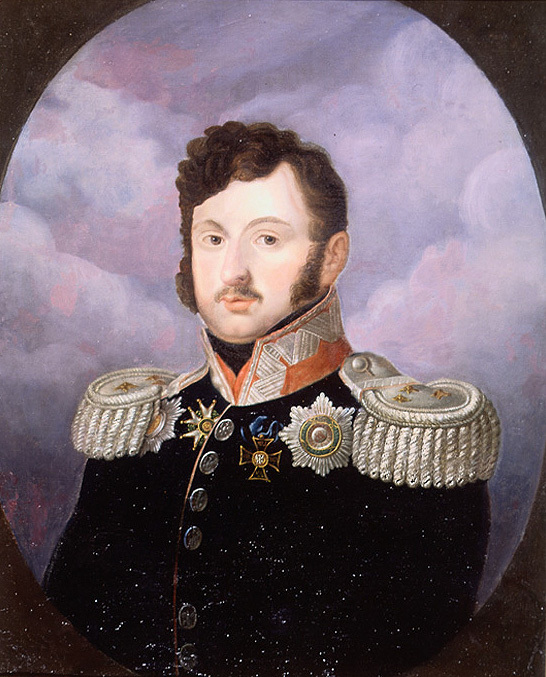
KRASIŃSKI WINCENTY (1782 - 1858)
Marshal of Sejm of the Kingdom of Poland (27 March - 27 April 1818)
Born on 5 April 1782 in Boreml in Volhynia, died on 24 November 1858 in Warsaw. He
came from a wealthy aristocratic family. Nominally enrolled in the national cavalry 1791, he
was consecutively nominated ensign and lieutenant 1793. On the downfall of the
Commonwealth in 1795, he was connected with the cosmopolitan Warsaw youth circles.
A member of the Warsaw Society of the Friends of Sciences 1804. With the French army
crossing the Polish borders 1806, as a Napoleon's devotee, he raised a cavalry squadron.
Nominated colonel 1806, he soon became commander of a light cavalrymen regiment, in
Napoleon's headquarters 1807, quickly promoting to brigadier 1811 and general of division
1813 - thanks to his stay at the emperor's court. Distinguished in the wars of 1806 - 1814.
Participated in numerous battles: of Wagram 1809, the 1812 - 1813 Russian campaign and
the 1814 campaign. A member of the Virtuti Militari Cross 1810, Commandor of the Legion
of Honour 1811. As the commander of Polish troops in the French service, after Napoleon's
abdication 1814, he came over under the tsar's orders and then took the Polish corps home. In
the army of the Kingdom of Poland (Congress Kingdom) as the officer of a Polish guard
division, he gained favours and trust of the Grand Duke Constantine due to his loyal attitude.
A sociable person, he kept a literary salon in Warsaw 1815 - 1827 and gave weekly famous
literary dinners, a member of Masonic lodges 1810 - 1821. Not very active politically as a
deputy from Przasnysz district, he was appointed marshal of the first sejm of the Kingdom of
Poland 1818. Simultaneously with that office, he received the title of general-aide-de-camp to
the emperor, which public opinion considered tactless towards the sejm. At sejm sittings, he
confined the statements of the opposition deputies as well as invalidated their comments on
the State Council's report. For his loyalty, he was awarded the White Eagle Order 1821 and
the office of senator-voivode, in spite of being nominated neither by the senate nor the
governor. Participating in the Sejm Court in 1828, he demanded to find the members of the
National Patriotic Society (Stanisław Sołtyk among others) guilty of high treason, and voted,
as the only senator, for death penalty for them, which brought him contempt from public
opinion. On the outbreak of the November uprising, he stayed loyal to Tsar Nicholas I and the
Grand Duke Constantine. Defected to Petersburg, he was excluded from the senators' circle
by a decision of the insurrection parliament. After 1831 general-aide-de-camp to Tsar
Nicholas I, a senator of the Russian Empire and a member of the State Council in the
Department for the Kingdom of Poland 1833. Actually deprived of political influence, he
concentrated on financial and family affairs, not letting his son Zygmunt (1812 - 1859), the
renowned poet and playwright, get openly involved against the tsar. He founded the
Krasiński Family Library in Warsaw 1844, containing valuable exhibits and a book collection.
A confidant of Tsar Alexander II, he temporarily held the office of the governor to the
Kingdom of Poland 1855 - 1856.
Portrait of Wincenty Krasiński, before 1826
Unknown Polish painter
oil, canvas, 76 x 60 cm
Polish Army Museum in Warsaw, cat. No 39508 MWP.
